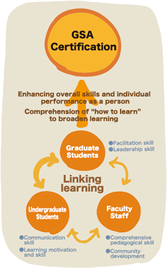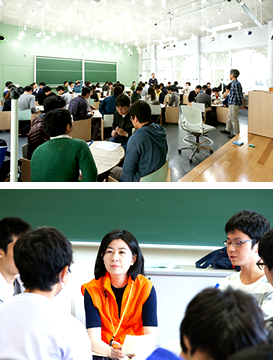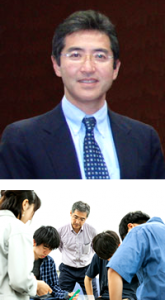Graduate students engage in educational activities through the Learning Community System

Tokyo Tech has built a communal development environment for undergraduate students, graduate students, faculty and staff, who, with deference toward each other, take the initiative in academic studies by learning, instructing, and deliberating together. This is the “learning community.”
Graduate Student Assistants (GSAs) form the core of this “learning community,” and, in a collaborative arrangement with faculty, participate in educational activities of the undergraduate degree program, and develop and operate online learning content.
Education systems in top universities abroad have already engaged graduate students in the education activities of undergraduate degree programs, and lead to in-depth learning, an enhanced appetite for academic study, and leadership training for the graduate student. Within Japan, expansion of the conventional TA (Teaching Assistant) program has led to more active involvement of students in learning support.
Of particular note, our GSA program represents the first large-scale effort in Japan, fostered by the Center for Innovative Teaching and Learning (CITL) and Institute for Liberal Arts (ILA) at Tokyo Institute of Technology.
“Learning Community” as a New Forum for Academics
Tokyo Tech GSA Program

The key feature to the GSA Program is the system of becoming a GSA through university coursework curricula.
Through basic courses and workshops, graduate students learn about leadership—maximizing the abilities of co-members and steering a team toward its goals. In addition, practicum courses and On-the-Job Training (OJT) present opportunities to deliver learning support to undergraduate students as a facilitator or reviewer, and for development of online educational materials. The acquisition of facilitation, tutoring, and collaboration skills combines with in-depth self-learning and enhancement of overall skills as a person.
Support from GSAs, who are senior but not far apart in years, provides stimulus to undergraduate students, whose appetite for academic study is enhanced by the GSAs presented as role models.
Faculty and staff, furthermore, provide suitable advice to students, aid in development of the community, and engage in their own learning as well.
The positive cycle of “linked learning” that arises out of this collective of GSAs, undergraduate students, faculty and staff contributes as additional stimulation to the academic atmosphere of the entire university.
Message from the GSA Program Executive Committee Chair:

“Enhance your potential through GSA activities.”
Educational reforms instituted in April 2016 at Tokyo Tech have led to a number of learning reforms being set forth. Among these, the GSA program envisions the creation of a “learning community” among undergraduate students, graduate students, faculty and staff that is purposed for mutual development.
GSAs need leadership skills to support learning among teams. The effort to broaden learning while eliciting the strengths of co-members can heighten individual performance when engaging with people. In fact, this capability is critically important in society.
Moreover, the work to support learning itself is enjoyable and tremendously satisfying. Come join the GSA program and expand your world!
Masao Murota
Professor, Institute for Liberal Arts
GSA Program Executive Committee
| Chair | Masao Murota | Professor | Institute for Liberal Arts |
| Vice Chair | Gaku Tanaka | Professor | Center for Innovative Teaching and Learning |
| Members | CROSS JEFFREY SCOTT | Professor | School of Environment and Society |
| Hiroki Oura | Assoc. Prof. | Center for Innovative Teaching and Learning | |
| Toru Nagahama | Specially Appointed Associate Professor | Center for Innovative Teaching and Learning |







